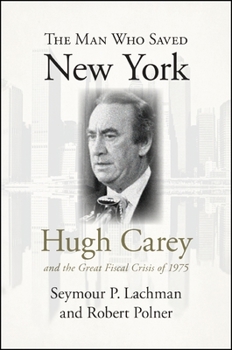The Man Who Saved New York: Hugh Carey and the Great Fiscal Crisis of 1975
A dramatic and colorful portrait of one of New York's most remarkable governors, Hugh L. Carey, with emphasis on his leadership during the fiscal crisis of 1975.
Winner of the 2011 Empire State History Book Award presented by New York State Archives Partnership Trust
The Man Who Saved New York offers a portrait of one of New York's most remarkable governors, Hugh L. Carey, with emphasis on his leadership during the fiscal crisis of 1975. In this dramatic and colorful account, Seymour P. Lachman and Robert Polner's examine Carey's youth, military service, and public career against the backdrop of a changing, challenged, and recession-battered city, state, and nation.
It was Carey's leadership, Lachman and Polner argue, that helped rescue the city and state from the brink of financial and social ruin. While TV comedians mocked and tabloids shrieked about the Big Apple's rising muggings, its deteriorating public services, and the threats and walkouts by embattled police, firefighters, and teachers, all amid a brutal recession, Carey and his team managed to hold on and ultimately prevailed, narrowly preventing a huge disruption to the state, national, and global economy. At one point, the city came within a few hours of having to declare itself incapable of paying its debts and obligations, but in the end stability and consensus prevailed, and America's largest city stayed out of bankruptcy court. The center held.
Based on extensive interviews with Carey and his family, as well as numerous friends, observers, and former advisors, including Steven Berger, David Burke, John Dyson, Peter Goldmark, Judah Gribetz, Richard Ravitch, and Felix Rohatyn, The Man Who Saved New York aims to place Carey and his achievements at the center of the financial maelstrom that met his arrival in Albany. While others were willing to let the city go into default, Carey was strongly opposed, since it would not only affect the state as a whole but would have reverberations both nationally and internationally.
In recounting the 1975 rescue of New York City and the aftershocks that nearly sank the state government, Lachman and Polner illuminate the often-volatile interplay among elite New York bankers, hard-nosed municipal union leaders, the press, and influential conservatives and liberals from City Hall to the Albany statehouse to the White House. Although often underappreciated by the public, it was Carey's force of will, wit, intellect, judgment, and experiences that allowed the state to survive this unparalleled ordeal and ultimately to emerge on a stronger footing. Further, Lachman and Polner argue, Carey's accomplishment is worth recalling as a prime example of how governments-local, state, and federal-can work to avoid the renewed the threat of bankruptcy that now confronts many overstretched states and localities.





